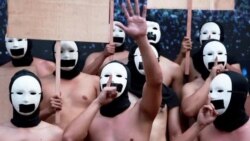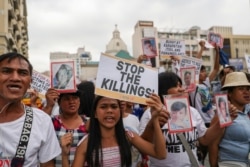On July 2, France-based watchdog Reporters Without Borders (RSF) published its annual “Press freedom predators” report. It listed 37 heads of state and governments who, it says, “crack down massively on press freedom.”
RSF named Philippines President Rodrigo Duterte and his government among the “predators,” for having “developed several ways to pressure journalists.”
According to RSF, the Philippines’ record includes a campaign of “grotesque judicial harassment against the news website Rappler and its editor, Maria Ressa”; the targeting of the Philippine Daily Inquirer; the refusal to renew the ABS-CBN network’s congressional franchise, which television and radio stations must have to operate; and online harassment “by pro-Duterte troll armies.”
Duterte’s spokesman Harry Roque dismissed the allegations. Recent press reports implicating the Philippine government in drug-war killings, followed by calls from former International Criminal Court (ICC) prosecutor Fatou Bensouda to investigate the government’s involvement, prove that media in the country remains free, Roque said.
“Absolutely bereft of merit,” Roque said of the RSF report. “If you look at the ICC prosecutor's findings, all he [sic] quotes is media critical of the government. So that proves that freedom of the press is alive and well in the Philippines.”
That is misleading. The existence of independent press and attempts to crack down on critical journalism are not mutually exclusive. Duterte’s administration specifically targeted media outlets that investigated the government’s “war on drugs,” RSF said.
Reporters Without Borders is not alone in criticizing Duterte. Other press freedom organizations reported on his government’s systematic attempts to suppress independent media in Philippines.
The Philippine Daily Inquirer, ABS-CBN and Rappler had all “proactively investigated the rising number of deaths from the government ‘war on drugs’,” Duterte subsequently singled them out in 2017, the non-profit Philippine Center for Investigative Journalism (PCIJ) said.
The PCIJ said the COVID-19 pandemic has exacerbated “the crisis of limited information and government control which had been going on with democratic decline.”
The U.S.-based rights group Freedom House reported that Duterte’s “hostile rhetoric toward members of the media” has worsened an already “perilous situation” in “one of the most dangerous places in the world for journalists.”
The attacks on media violate the Philippines constitution, which “provides for freedoms of expression and the press,” Freedom House said.
The PCIJ documented 228 attacks and threats against journalists in 2016-2020, and 19 killings of journalists in 2016-2021.
Being a journalist does not “exempt you from assassination,” and media members would not be killed if they didn’t “do anything wrong,” Duterte said infamously during a June 2016 press conference as president-elect when asked how he would handle the murder of journalists.
In September 2020, the National Union of Journalists of the Philippines launched the Masked Media campaign against what they called Duterte’s efforts “to suppress freedom of the press and pervert the truth.”
At the time, Len Olea of the online publication Bulatlat told LiCAS.news, a Bangkok-based Catholic news agency, that since becoming president in 2016, Duterte had increasingly used the Philippines judiciary to suppress independent journalism. At least 23 media personalities had been hit with libel, cyber libel or other charges, Olea said.
Chief among those singled out is Ressa, who, as CEO and Executive Editor of Rappler, was named a Time magazine Person of the Year in 2018 and listed among the “Guardians” fighting against “the War on Truth.”
According to RSF, Ressa “has been the target of at least ten arrest warrants on a range of charges, all equally far-fetched.” A Manila court convicted Ressa in a high-profile cyber libel case in June 2020, prompting international criticism.
The U.N. High Commissioner for Human Rights’ spokesperson said Ressa’s prosecution fit into “a pattern of intimidation” against an independent media outlet that “fiercely guarded its independence and its right to conduct in-depth investigations and to criticize the authorities.”
After Ressa was acquitted on June 3 in a separate cyber libel case, Roque said that Duterte himself had never filed a libel case against any journalist critical of him.
Ressa responded that “actions speak louder than words,” noting that social media attacks and the prosecution of her media outlet followed Duterte’s attack on Rappler during his July 2017 State of the Nation address. In it, Duterte claimed Rappler is owned by "Americans" in violation of the Philippines’ constitution.
Rappler faced several tax and libel cases amid attacks by Duterte, who labeled the outlet “fake news.”
The Philippines’ Securities and Exchange Commission (SEC) revoked Rappler’s articles of incorporation for allegedly violating constitutional provisions on foreign ownership and control.
Rappler had issued Philippine Depositary Receipts (PDR) to the U.S.-based non-profit Omidyar Network as a source of funding.
According to the Philippine Daily Inquirer, a PDR holder has “the right to ‘own’ the stocks of a company and to receive their dividends or interest,” but the actual title over the stock stays with the company.
The Omidyar Network, set up by eBay founder Pierre Omidyar, has also provided funding to RSF.
The SEC has allowed Rappler to continue operating, saying it is free to “exhaust legal remedies” before the decision to revoke its media license is final.
The Manila-based Center for Media Freedom and Responsibility (CMFR) quoted major Philippines' press organizations as calling the move a “pattern of restricting criticism.”
In 2017, Duterte sought to block the renewal of ABS-CBN’s franchise after it failed to run his campaign ads in the 2016 presidential election.
During a Senate hearing in February 2020, ABS-CBN apologized to Duterte for not running the ads. At the time, Duterte claimed he had not attempted to influence any member of the House of Representatives to block the broadcaster’s bid to renew its 25-year license.
Less than three months later, the Philippines’ National Telecommunications Commission issued a cease-and-desist order after ABS-CBN’s franchise expired. On July 10, 2020, the House of Representatives moved not to renew it.
New York-based Human Rights Watch linked that to the network’s critical coverage of the government’s drug war.
In February 2021, Duterte said he would not allow the broadcaster — the oldest in Southeast Asia and the largest in the Philippines — to operate even if granted a new franchise.
CMFR said the ABS-CBN saga delivered “a message to every media company” that Duterte could do the same to other news outlets, “which would then spell the end of press freedom under this administration.”
Duterte also repeatedly accused the Philippine Daily Inquirer, which publishes a bi-weekly list of suspected drug dealers and users killed in the drug war, of tax evasion, among other offenses.
A controlling stake in the Philippine Daily Inquirer’s parent company, the Inquirer Group of Companies, was sold to tycoon Ramon See Ang in 2017.
Ang has publicly supported Duterte’s war on drugs.
Rappler quoted an unnamed source as saying the previous owners had been “bullied” into selling the controlling stake.







